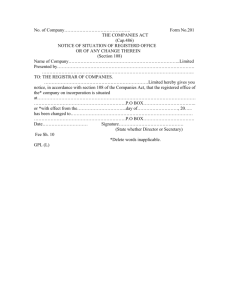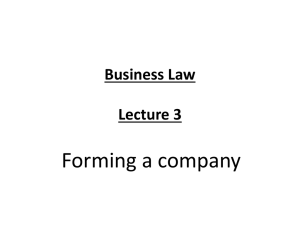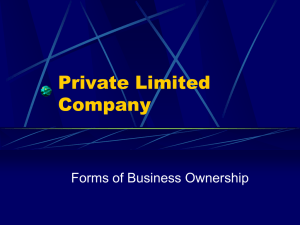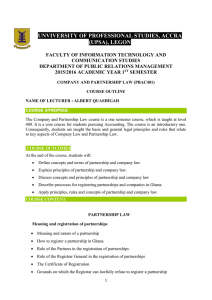formation of companies under the new companies act 2011
advertisement
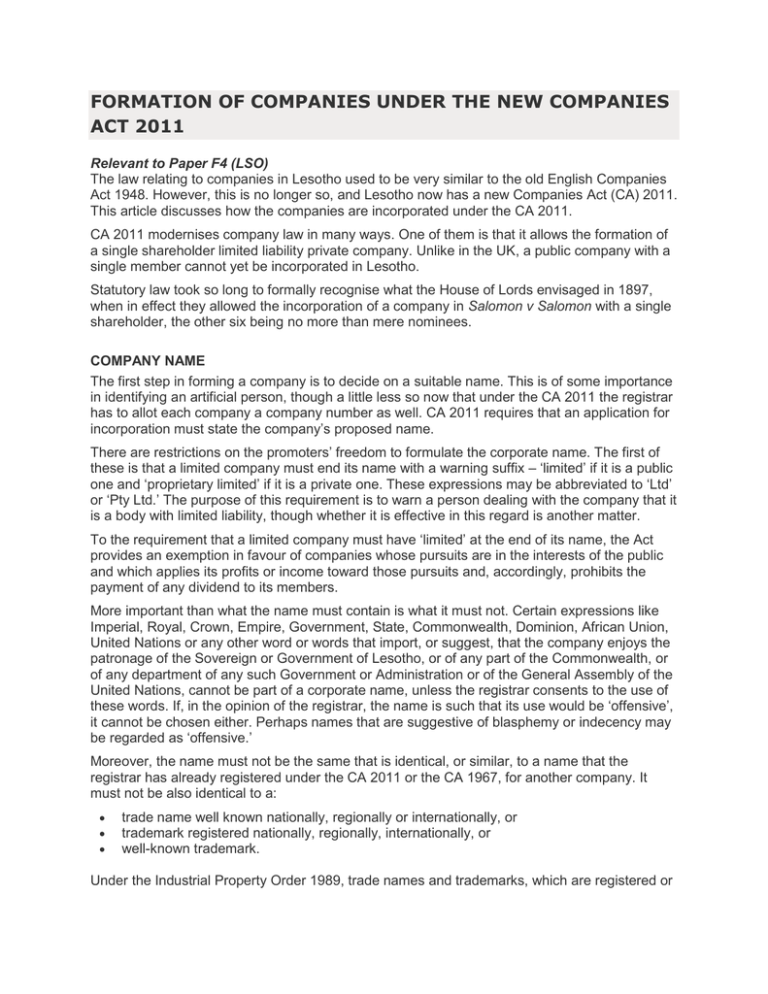
FORMATION OF COMPANIES UNDER THE NEW COMPANIES ACT 2011 Relevant to Paper F4 (LSO) The law relating to companies in Lesotho used to be very similar to the old English Companies Act 1948. However, this is no longer so, and Lesotho now has a new Companies Act (CA) 2011. This article discusses how the companies are incorporated under the CA 2011. CA 2011 modernises company law in many ways. One of them is that it allows the formation of a single shareholder limited liability private company. Unlike in the UK, a public company with a single member cannot yet be incorporated in Lesotho. Statutory law took so long to formally recognise what the House of Lords envisaged in 1897, when in effect they allowed the incorporation of a company in Salomon v Salomon with a single shareholder, the other six being no more than mere nominees. COMPANY NAME The first step in forming a company is to decide on a suitable name. This is of some importance in identifying an artificial person, though a little less so now that under the CA 2011 the registrar has to allot each company a company number as well. CA 2011 requires that an application for incorporation must state the company’s proposed name. There are restrictions on the promoters’ freedom to formulate the corporate name. The first of these is that a limited company must end its name with a warning suffix – ‘limited’ if it is a public one and ‘proprietary limited’ if it is a private one. These expressions may be abbreviated to ‘Ltd’ or ‘Pty Ltd.’ The purpose of this requirement is to warn a person dealing with the company that it is a body with limited liability, though whether it is effective in this regard is another matter. To the requirement that a limited company must have ‘limited’ at the end of its name, the Act provides an exemption in favour of companies whose pursuits are in the interests of the public and which applies its profits or income toward those pursuits and, accordingly, prohibits the payment of any dividend to its members. More important than what the name must contain is what it must not. Certain expressions like Imperial, Royal, Crown, Empire, Government, State, Commonwealth, Dominion, African Union, United Nations or any other word or words that import, or suggest, that the company enjoys the patronage of the Sovereign or Government of Lesotho, or of any part of the Commonwealth, or of any department of any such Government or Administration or of the General Assembly of the United Nations, cannot be part of a corporate name, unless the registrar consents to the use of these words. If, in the opinion of the registrar, the name is such that its use would be ‘offensive’, it cannot be chosen either. Perhaps names that are suggestive of blasphemy or indecency may be regarded as ‘offensive.’ Moreover, the name must not be the same that is identical, or similar, to a name that the registrar has already registered under the CA 2011 or the CA 1967, for another company. It must not be also identical to a: trade name well known nationally, regionally or internationally, or trademark registered nationally, regionally, internationally, or well-known trademark. Under the Industrial Property Order 1989, trade names and trademarks, which are registered or otherwise well-known in Lesotho, cannot be expropriated and a company may not use them in its name because it may be harmful to legitimate business interests of other parties and also detrimental to the public. It is the duty of promoters to search the registers, directories and records of names of companies in Lesotho and make sure that their proposed name is not identical to any of them. And, if it does, then they have to attach the consent of the relevant company. Last, the use of the name must not contravene any law in force in Lesotho. The common law rule of passing off also limits the choice of promoters. They must take care that the name they choose must not be identical to, or closely resemble, the name of another enterprise or trade name, or in some cases the trademark. The case of Aerators Ltd v Tollett (1902) illustrates it very well. In that case, the business of the plaintiffs, Aerators Ltd, consisted of selling ‘Sparklet’, a small device containing carbonic acid gas by means of which the contents of bottles were aerated. Tollett proposed to set up a company with the name of ‘Automatic Aerators Patents Limited’ for the aeration of liquids contained in tanks or large containers. The plaintiffs objected to the name and applied for an interdict to prevent the registration of a company under that name on the ground that such a name so closely resembles their own name as to be calculated to deceive. Farwell J refused to grant the interdict and observed that a company has a greater right than an individual in respect of names that are identical. For ‘John Smith’ cannot prevent other persons of the same name from using their own name; but ‘John Smith Limited’ can prevent the registration of any other company as ‘John Smith Limited’. It was explained that the words ‘calculated to deceive’ did not mean intentional fraud, but only ‘likely to deceive’. It is a question of fact in each case whether the name of the new company is so similar to that of the old company as to induce the belief that the two companies are identical. In the case, the word ‘aerators’ has been used in the corporate name. The word ‘aerators’ is a common word in the English language to apply and rightly describe a machine for producing a particular result. The plaintiffs cannot monopolise the use of a common English word. In considering whether a name is calculated to deceive, it is material to see if the name is simply a word in ordinary use representing a machine, or an article of commerce. The court concluded that, in this case, the plaintiff’s action is an attempt to monopolise a word that is in ordinary use in the English language and this cannot be permitted. Promoters, therefore, should carefully consider the implications if they choose to use words of ordinary use as part of the corporate name. They should also remember that the registrar, when approving a name, does consider its visual and phonetic aspects. The registrar is aware that members of the public do not often see names side by side, but one after the other, with a time lapse in between and has regard to the likelihood of imperfect recollection. Coca Cola and Koka Kola phonetically sound similar, and so is Kentucky Fried Chicken and Fried Kentucky Chicken. It should be apparent that it might not be easy to find a name acceptable to both the promoters and the registrar. Nevertheless, until a suitable name is found, it is impossible to incorporate a company. Under the CA 1967 promoters could suggest several names to the registrar and ask if any one of them is available for registration as a corporate name. Once the registrar indicated their approval, the promoters could ask the registrar to ‘reserve’ that name for a certain period. CA 2011 does not have such a provision. However, Regulation 6 does permit a promoter to ‘reserve’ a name acceptable to the registrar before entering into a pre-incorporation contract and submit registration documents of the company within 14 days of the registration of the corporate name. Promoters might find this useful. REGISTRATION DOCUMENTS After finding an appropriate name, promoters of their legal practitioners lodge the following documents with the Registrar of Companies for incorporating their company: An application for incorporation in the prescribed form Form of consent to act as a director in respect of each of the directors Articles of incorporation. The application for incorporation provides the following details: the corporate name it wishes to be registered its name under which it proposes to trade whether it is a public or a private company the authorised share capital, the number of shares and the nominal value of each of the shares main purposes/intended business of the company, identified in terms of the Lesotho Business Classification Codes set out in Schedule I – they should be contained in an annex and attached to the application declaration that the liability of the members is limited rights, privileges, limitations and conditions attached to each share, if different from those set out in s25 CA (shares issued by the company must also provide this information) the maximum number of directors the company proposes to have. A public company must have at least two and a private company one. Their names, including the nationality and contact details, must be provided as well. Promoters must attach a form of consent to act as a director in respect of each of the directors (the rationale for stating the maximum number of directors is not clear since the CA 2011 does not put a ceiling on the number of directors a company may have) the address and contact details of the registered office of the company, and the address for the service of documents (the situation of the registered office of a company determines its nationality, domicile and residence for taxation purposes. If a company has the registered office in Lesotho, then it has Lesotho nationality and domicile and is liable for tax on its income in Lesotho) whether the company would use the model, or its own, articles. The promoters must subscribe for at least one share of the company and indicate the month and year the company expects to start its business. Section 20 requires that such shares must be issued to them immediately after the registration of the company. The application also declares that: ’We agree to subscribe for the number of shares indicated opposite our names and hereby make application for the company to be registered under the provisions of the Companies Act 2011.’ Women married in community of property can also incorporate a company without obtaining the consent of their husband. This is an innovation since, under the common law and traditional law, women married in community of property are considered a minor. The memorandum of association, which played such a pivotal role in the management and operations of a company, is now history and is no longer required to incorporate a company. However, all the information that a memorandum used to contain is now a part of the application for incorporation. Other information – for example, about the directors, registered office address and the address for service of documents – is the first expression of an obligation that will continue throughout the company’s life periodically to inform the registrar about these matters. Articles of incorporation under the CA 2011 have different legal implications than articles of association in the CA 1967. Under the CA 1967 articles of association bound the company and its members as if they had been signed by each member and obliged each member to observe all the provisions of the articles. Under the CA 2011, articles of incorporation do not have this legal effect. Nor do members have to have constructive knowledge of articles of incorporation. There are three sets of model articles of incorporation provided in the Act: one for private companies, one for public companies and one for single shareholding companies. Articles of incorporation, like articles of association, provide many of the rules and regulations for the management and operations of the company. They are particularly important under the CA 2011 because of the range of matters the Act allows to be regulated by the articles of incorporation. A central question would be the extent to which model articles should be adopted. Of course, there is an option of not registering any articles of incorporation and relying entirely on the model articles. This may not be wise because most companies on initial registration would be private ones and the promoter, or promoters, may wish to include more elaborate provisions – for example, as regards restrictions on the transfer of shares. The model articles for private companies give the directors a discretion to refuse to register a transfer of share to a person they did not approve. The promoter may wish to elaborate on that and provide in the articles that if a member wishes to sell shares, they will first be offered to the existing shareholders at a price auditors consider fair. If the registrar is satisfied that the requirements for incorporation are met and the purposes for which the promoters wish to incorporate their company are ‘lawful’, the company is incorporated and a certificate of incorporation issued. The certificate states that the company has been incorporated, provides its name and the company number, and the date of incorporation. Section 7(2) declares that the certificate is conclusive evidence that the requirements of the Act regarding incorporation have been complied with and that the company is duly incorporated under the Act. The effect of the incorporation is that the company legally exists in Lesotho. The functions of the registrar in deciding whether or not to incorporate the company are administrative, rather than the judicial, but though a refusal to register can be challenged by judicial review, it is unlikely to be successful. The registration of a company cannot be challenged because of the conclusive effect of the certificate. Apart from the certificate of incorporation, the company will also be a given a document setting out the particulars of the company in accordance with Schedule 6. Schedule 6 identifies three kinds of companies: public or private or a single shareholding company. Most of the details in the document are common such as the name of the company, activities it may engage in, the authorised share capital, number of shares and the nominal value of the share, shares subscribed and the limited liability of the member or members of the company. As regards a public company, the document specifies that it may have an unlimited number of shareholders and may issue and transfer shares to the public. As regards a private company, the document specifies that the maximum number of shareholders in the company must not exceed 50, not including the existing and former employee shareholders, that the right to transfer shares is restricted and the company is prohibited from inviting members of the public from subscribing to its shares and debentures. As regards a single shareholding company, the document specifies the same information as a private company with the difference that the number of shareholders is limited to one. The document thus elaborates upon the certificate of incorporation. COMMENCEMENT OF BUSINESS The company acquires legal personality from the date of incorporation and may do anything, which it is permitted or required to do, by its articles of incorporation or under the CA [s9(2)]. It is now lawful for the company to carry on general commercial activities in Lesotho. Apparently, the commercial activities initially may have to be limited to those that were stated in the application for incorporation and which the document issued under Schedule 6 alludes to. Even these commercial activities can only be carried on if the company succeeds in obtaining a licence for each of them [s7(3)]. A certificate to commence business is no longer required. Shareholders may decide to alter major or core business activity of the company by passing a special resolution [s53(2)(g)]. The dissenting shareholders, if they so wish, may ask the company to purchase their shares at a ‘fair and reasonable price’ as may be determined by the board of directors [s39 and 42(1)]. Licence would be required from the relevant ministry before the new business activity, or activities, could be carried on. If the company fails to commence business within 12 months of the issue of the certificate of incorporation, the registrar may remove a company from the company register, except when it is due to delays relating to licensing or other legal requirements, or if the company had valid and reasonable grounds to the satisfaction of the registrar [s87(5(a) and (6)]. Written by a member of the Paper F4 (LSO) examining team
